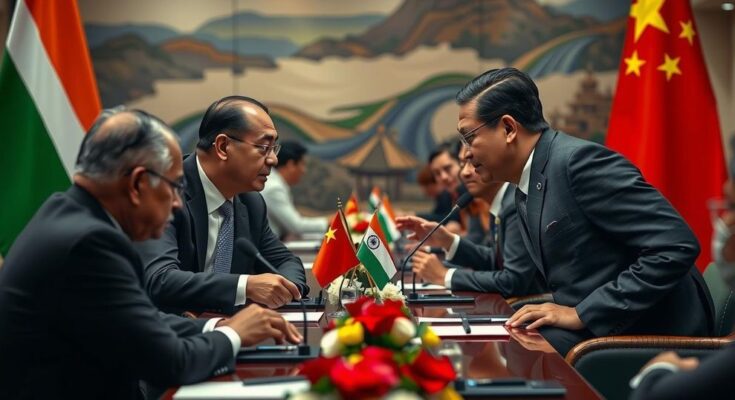India and China are taking significant steps towards improving relations by discussing the resumption of direct flights and the Kailash Mansarovar pilgrimage following a high-level meeting between their foreign ministers at the G20 Summit. This engagement follows a successful disengagement process in eastern Ladakh, further indicating a desire for stability and cooperation despite previous tensions.
In a significant advancement for bilateral relations, India and China have initiated discussions aimed at resuming direct flights and restarting the Kailash Mansarovar pilgrimage, following a recent meeting between External Affairs Minister S. Jaishankar and Chinese Foreign Minister Wang Yi in Rio de Janeiro on the sidelines of the G20 Summit. This engagement marks the first high-level dialogue since the successful disengagement process in Depsang and Demchok in eastern Ladakh, which had been contentious since the stand-off began in May 2020, exacerbated by the pandemic that led to the suspension of flights and the pilgrimage. Both ministers acknowledged the importance of maintaining peace and stability in border areas, recognizing the contributions of military talks and cooperation at international forums like BRICS and SCO to furthering their relationship. Minister Jaishankar emphasized that India’s foreign policy is characterized by principled consistency, advocating for a multipolar world, and he reiterated that India does not perceive its relationships through the lens of its ties with other nations. The Chinese foreign minister expressed agreement on the significance of India-China relations, underlining the necessity to stabilize ties and address existing differences in a constructive manner. Conversely, Jaishankar and Yi engaged in discussions that transcended bilateral issues, advocating for data sharing on transborder rivers and media exchanges to enhance cooperation. Moreover, the officials remarked upon the shared perspectives of both leaders, considering the historical and strategic implications of their nations’ collaboration. Speaking on the evolving state of bilateral relations, Chinese Foreign Ministry spokesperson Lin Jian indicated that interaction between Beijing and New Delhi is evolving toward a “new starting point”. He affirmed that both nations must honor their core interests, nurture mutual trust through dialogue, and aim to restore their relations to a trajectory of stable and healthy development, which aligns with the aspirations of the Global South and historical trends. This dialogue reflects both nations’ commitments to engaging diplomatically to resolve conflicts while recognizing their respective geopolitical roles.
The India-China relationship has been historically complex and is influenced significantly by territorial disputes and differing political stances. The tension escalated in 2020 with the standoff in Ladakh, resulting in military confrontations and the deaths of Indian soldiers. This situation prompted both nations to engage in a series of military-level talks aimed at de-escalation. As the COVID-19 pandemic affected global travel, direct flights and key religious pilgrimages, such as the Kailash Mansarovar trek, were suspended, further straining ties. The recent meeting between foreign ministers signals a potential thaw in relations, focusing on diplomacy and cooperation amidst ongoing challenges and varying interests.
The dialogue between India and China signals a positive step towards stabilizing diplomatic relations and recognizing mutual interests. The recent discussions regarding the resumption of direct flights and the Kailash Mansarovar pilgrimage illustrate a commitment to reinforce connections between the two nations. By addressing differences and enhancing cooperation through dialogue, both countries aim to foster a stable and constructive partnership that aligns with broader regional ambitions and global expectations.
Original Source: www.ndtv.com




